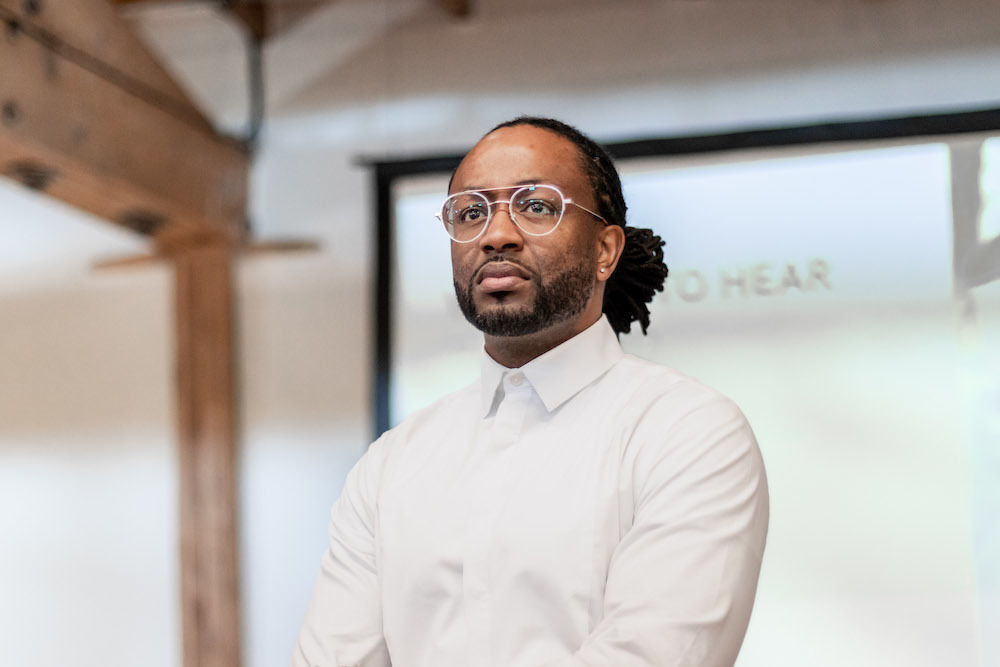When SpringGR started in 2013, there were only about 70 businesses with more than $250,000 in revenue that were owned by people of color in Grand Rapids, as compared to the 11,000 businesses in the city overall in that revenue category.
A recent review by SpringGR, a nonprofit entrepreneur support organization (ESO), revealed that number has not budged in eight years. Of the 11,500 businesses in the city that made $250,000 or more in the past year, only 0.6% were owned by people of color, which is about 70 businesses, according to Attah Obande, director of dream fulfillment, who co‑leads SpringGR with Arlene Campbell.
“We knew the picture was not going to be pretty, but we didn’t expect it to be that ugly,” Obande said. “We clearly have a problem and a gap that needs to be filled.”
SpringGR on Nov. 16 convened a meeting of community stakeholders at the Goei Center for the unveiling of its new program, The 250 Project, which will seek to help minority‑owned businesses with at least $100,000 in revenue and one employee scale up their revenue to at least $250,000 or by 30% by the end of 2022.
The program will use the StreetWise MBA curriculum by Interise, a national nonprofit founded in 2004 that helps small businesses develop their companies.
Obande said at the event he has read Business Journal articles over the years citing studies that ranked Grand Rapids on various metrics, such as it being the No. 2 city for new small businesses, yet 122nd in the U.S. for Hispanic entrepreneurs and the second‑worst in the country for African Americans economically.
He said his organization hasn’t seen that equity gap shrinking due to the many barriers entrepreneurs of color still face.
In 2020, the W.K. Kellogg Foundation commissioned Linda Fowler, founder and CEO of Regionerate, to produce a Grand Rapids Entrepreneurial Ecosystem Assessment that took nine months and examined gaps in the entrepreneurial ecosystem through interviews with ESOs like SpringGR, conversations with entrepreneurs and other research.
Obande said SpringGR found three conclusions from the report of particular interest:
- There is a need to address barriers to entrepreneurs of color more effectively, including programmatic, cultural and financial barriers.
- Small business owners want to support each other by networking and partnering in ways that grow their businesses — especially entrepreneurs of color.
- The current capital stack is not inclusive and has gaps, especially for growth‑focused companies.
“We have a question of scale in our city. … Over the years, we’ve tried to address this. We’ve said, ‘OK, which of the businesses that have come through SpringGR have the right founders and have a scalable business, and what supports can we put around them to allow them to grow?’ We never were able to crack that cookie fully,” Obande said.
SpringGR recently initiated conversations with other ESOs, entrepreneurs above and below the $250,000 mark, and lenders, and four main problems stood out: Businesses of color need more customers, a scaling‑up methodology, industry‑specific knowledge, and accessible and attractive (not high‑interest) lending.
Although community development financial institutions like Northern Initiatives and Rende Progress Capital are working on that last piece, more is needed to improve the full picture.
SpringGR’s goal is that The 250 Project — a 14‑session, seven‑month program — will systematically address each of those needs in ways its original 12‑week business training program is not able to do.
The 250 Project will aim to:
- Increase business revenue by 30% or at least up to $250,000 by the end of next year.
- Identify new and retain repeat customers.
- Build a “scale‑up” plan for all participating businesses.
- Identify lending partners that will build flexible, low‑interest products, working with the business to get to a “Yes.”
Interise’s StreetWise MBA curriculum has been implemented in over 90 communities nationally, focusing on underserved entrepreneurs and culminating in a three‑year comprehensive growth action plan. Since its creation, StreetWise MBA has delivered an average growth rate of 36% for businesses that complete the program.
Obande said SpringGR invited each of the 55‑plus individuals to the Nov. 16 event so they could contribute ideas and solutions that can be woven into the program to ensure the best outcomes. Specifically, what they believe contributes to the problem, what they are willing to commit to as a problem‑solver, and who is not in the room that should be (and could be invited next time).
Attendees broke into small groups after the presentation and reported ideas to the room for increasing the economic success of Black, Indigenous, people of color (BIPOC)‑owned businesses, such as:
- Being willing to consider mergers and acquisitions as a path to growth rather than only starting from the ground up, an idea suggested by Eastern Floral founder Bing Goei.
- Increasing the diversity of their networking circles, suggested by Sharouq Almallah, director at the Richard M. and Helen DeVos Center for Entrepreneurship & Innovation (CEI) at Grand Valley State University.
- Reimagining venture capital and banks to specifically target minority groups
- Considering more diverse categories besides lifestyle and service industries when looking to start a business
- Additional partnerships such as equity investments to raise capital rather than only looking to banks
- Educating entrepreneurs until they overcome the “side hustle” mindset and embrace a mindset of building enterprise‑scale, generational wealth
Applications for businesses that want to go through the program open on Dec. 1, and informational sessions for stakeholders, applicants and the public will be held on Dec. 16 and Jan. 13.
As of now, Obande said SpringGR does not know how many businesses in the community will meet the $100,000 revenue and one employee threshold, but he is looking forward to finding out.
More information is at springgr.com.

